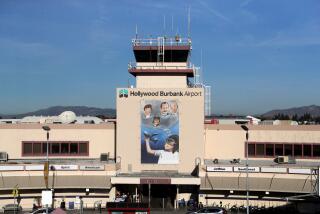Official Driving Burbank Airport Project Resigns
- Share via
BURBANK — Burbank Airport Executive Director Thomas E. Greer--a driving force and a controversial figure behind a two-decade long effort to build a new airline terminal--announced his resignation Friday after 15 years on the job.
Greer steps down just as the long-delayed terminal project gained new momentum this week. Sources familiar with the situation say that Greer came under pressure to leave because of his resistance to accepting restrictions on flights--seen as a key concession to win political support for the terminal.
“He’s very old school in his belief that airports must rigidly hold the line against any local demands for noise limits and other restrictions,” said a source who asked not to be identified. “It now appears that Greer has paid the price for holding views that fortunately are becoming less and less common in the industry. The industry is coming to recognize that compromise is good business.”
Airport controller Dios Marrero was appointed interim executive director.
In an interview, Greer declined to address the specific reasons behind his departure, but said the time for new leadership had arrived.
“I feel like a cowboy that’s been riding on a bucking bronco where one of two things can happen,” Greer said. “Either it stops bucking and you break the horse or you get thrown off. The lucky cowboys realize that the horse is not going to stop bucking and they get to choose when they get off.”
Greer said his biggest regret was not seeing the terminal through to completion.
Ironically, a series of events this week has put the terminal issue closer to resolution than at any time over the past four years, according to almost all parties in the dispute.
In 1995, a new Burbank City Council majority was seated and began pushing for flight restrictions to curtail noise--triggering a war with Glendale and Pasadena, which share ownership of the airport with Burbank.
After trading wins and losses in as many as a dozen court cases, the state Court of Appeals handed down a key ruling May 5, giving the city of Burbank power over land-use decisions at the airport.
That court ruling was followed two weeks later by a Federal Aviation Administration opinion that said the Burbank-Glendale-Pasadena Airport Authority could not impose flight caps or curfews, as sought by Burbank, without conducting a lengthy noise study.
On the heels of those developments, the Airport Authority on Monday submitted a compromise plan to Burbank calling for downsizing the proposed terminal from 19 gates to 16 gates.
Then on Tuesday, the Glendale City Council broke with past policy and issued a statement saying it would support a mandatory overnight curfew on flights--another demand the Airport Authority had long resisted.
Some observers viewed Greer’s departure as the next logical step in the process--saying a more moderate administrator is now needed to conclude the negotiations between Burbank and the Airport Authority.
Greer said he does believe the federal government needs to oversee commercial air transportation, but insisted he was sensitive to local concerns about noise.
“I believe there is need for oversight in a national transportation system,” he said. “But to suggest that an airport manager is not concerned about the impact on the local community is wrong.” Colleagues said Greer established himself as a prominent figure in national aviation circles, working on issues from snow removal to winning increased federal funding for airport infrastructure.
The Alabama native began his aviation career in the U.S. Marine Corps, flying more than 300 combat missions in Southeast Asia. After leaving the armed forces in 1970 he went on to work in airports in North Carolina, Mississippi and Salt Lake City.
Greer became head of Airport Services at Burbank in 1984 and later was named Executive Director of the airport in 1994. He also serves on the Board of Directors of the American Assn. of Airport Executives.
He was named the association’s Southwest Chapter Airport manager of the year in 1988.
The resignation follows a series of rapid-fire developments over the past few weeks in the protracted political and legal battle over efforts to build a new terminal at Burbank on 130 acres of land owned by Lockheed Martin.
Under Greer, Burbank Airport officials had long held that passenger demand should determine the size of its new terminal building, a position the Airport Authority backed with state and federal lawsuits alleging Burbank was interfering with national transportation.
More to Read
Sign up for Essential California
The most important California stories and recommendations in your inbox every morning.
You may occasionally receive promotional content from the Los Angeles Times.













